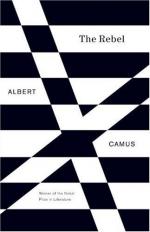
|
| Name: _________________________ | Period: ___________________ |
This test consists of 15 multiple choice questions and 5 short answer questions.
Multiple Choice Questions
1. The ancient regime monarchy was founded on what?
(a) Slave rebellion.
(b) Christianity.
(c) Honest government.
(d) Divine right.
2. The ancients, according to Part 2, believed rebelling against nature was the same as rebelling against what?
(a) Satan.
(b) God.
(c) Government.
(d) Oneself.
3. According to Camus, we are living in an era of what and perfect crime?
(a) Logic.
(b) Passion.
(c) Philosophy.
(d) Premeditation.
4. According to Part 3, Bakunin believed what is the incarnation of crime?
(a) The Nazis.
(b) The State.
(c) The Government.
(d) The Priests.
5. According to Camus' introduction, what is rare?
(a) Intense love.
(b) Logic.
(c) Passion.
(d) Perfect crime.
6. According to the ancients referenced in Part 2, what counterbalances negation?
(a) Power.
(b) Affirmation.
(c) Love.
(d) Strength.
7. According to Part 3, nihilists believed in nothing but what?
(a) Reason and reality.
(b) Self-interest and religion.
(c) Reality and self-interest.
(d) Reason and self-interest.
8. Violence is directed at one and all in the service of what?
(a) An abstract idea.
(b) An altrustic idea.
(c) An absolute value.
(d) An unreasonable offer.
9. According to Part 3, The Social Contract is an inquiry into the legitimacy of what?
(a) Power.
(b) Justice.
(c) Religion.
(d) Rebellion.
10. What belief system accepts suicide as legitimate?
(a) Marxism.
(b) Absolute nihilism.
(c) Dandyism.
(d) Romanticism.
11. In Part 2's introduction, the most elementary form of rebellion expresses an aspiration to what?
(a) Power.
(b) Order.
(c) Values.
(d) Murder.
12. According to Saint-Just in Part 3, what is stronger than tyrants?
(a) Religion.
(b) Power.
(c) Revolution.
(d) Morality.
13. According to Part 3, Hegel allowed mutual recognition of minds to be reached in what?
(a) Power.
(b) Religion.
(c) Love.
(d) Politics.
14. According to Stirner in Part 2, what leads to the justification of crime?
(a) Revolution.
(b) Rebellion.
(c) Power.
(d) Love.
15. According to Camus in Part 2, what "never has the patience to await complete control of the world?"
(a) Law of conflict.
(b) Law of murder.
(c) Law of religion.
(d) Law of power.
Short Answer Questions
1. Nietzsche cannot separate what from lucidity?
2. In Part 3, Bakunin was the only one of his contemporaries to declare war on what?
3. What two forms of rebellion are being considered in the book?
4. By what concept is metaphysical rebellion motivated by?
5. In Part 3, who does Camus say is one of the "most remarkable and influential minds of the 1830s and 40s"?
|
This section contains 365 words (approx. 2 pages at 300 words per page) |

|




